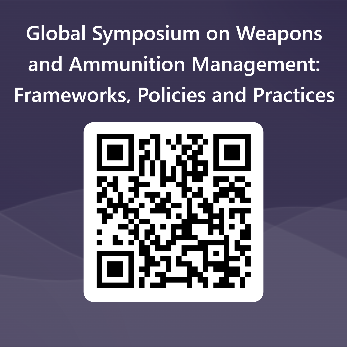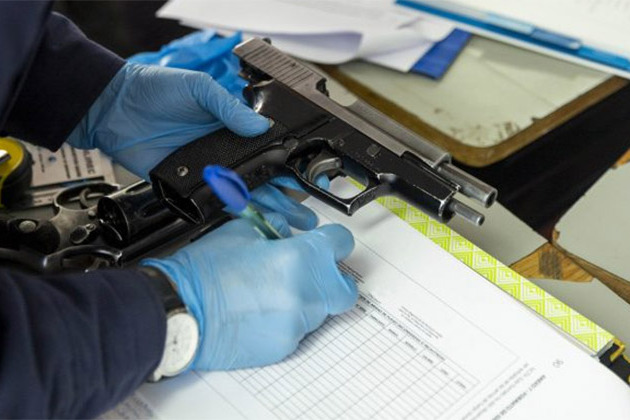Armed violence is estimated to claim over half a million lives annually and costs hundreds of billions of dollars. The illicit proliferation and misuse of weapons, including SALW, and ammunition play critical roles in exacerbating armed conflict, violence, including gender-based violence, terrorism and crime, contributing to the instability and insecurity of regions already affected by climate change, inter-communal violence, migration, poverty and exclusion. Further, unplanned explosions at ammunition sites generate severe humanitarian, socio-economic, environmental and public health impacts. Ultimately, ineffective WAM impedes sustainable development.
The symposium will provide the first global platform for the sharing of information, experiences, and knowledge among different stakeholders on:
- New developments regarding international normative frameworks, policies and practices covering through-life management of conventional weapons and ammunition.
- Lessons learned for strengthening national frameworks, policies and practices for through-life management of weapons, including SALW, and ammunition.
- How to enhance national ownership and approaches for international cooperation including assistance for strengthening national frameworks, policies, and practices.
EVENT RECORDING
A recording of this event is available on our YouTube Channel, and below, in English, Spanish and French.
English
Spanish
French
WHEN & WHERE
27 November 2023, 10.00 – 18.00 CET. Please consult this website to find your local time.
Hybrid format: in-person at International Conference Centre Geneva (Room C, ground floor) & online access via a unique access link.
AGENDA
10.00 – 10.45 Opening Session
Welcome Remarks:
- Robin Geiss, Director, UNIDIR
Opening Remarks:
- H.E. Ambassador Thomas Goebel, Permanent Representative of Germany to the Conference on Disarmament in Geneva
Keynote Address:
- H.E. Ms. Maritza Chan Valverde, Permanent Representative of Costa Rica to the United Nations in New York
Moderated by Sarah Grand-Clément, Researcher, UNIDIR
10:45 – 11:00 Coffee Break
11:00 – 12:15 Session 1: New developments regarding international and regional normative frameworks and policies covering through-life management of weapons and ammunition
Speakers include:
- Mélanie Régimbal, Chief, United Nations Office for Disarmament Affairs’ Geneva Office
- H.E. Ambassador Abdel-Fatau Musah, Commissioner, Political Affairs, Peace and Security, ECOWAS
- Ms. Pier Angelli De Luca, Program Manager & Specialist, Department of Public Security, Organization of American States
Questions, answers, and open, moderated discussion
Moderated by Paul Holtom, Head of Conventional Arms and Ammunition Programme, UNIDIR
12:15 – 13:30 Lunch Break
12:25 – 13:25 Side Event: Perspectives from UN support and assistance for through-life weapons and ammunition management
Speakers include:
- Osama Khateeb, Weapons and Ammunition Management Operations Advisor, UN Mine Action Service, UN Support Mission in Libya
- Simonetta Grassi, Chief of the Global Firearms Programme, Senior Crime Prevention and Criminal Justice Officer, UN Office on Drugs and Crime
- Thomas Kontogeorgos, Chief, Disarmament, Demobilization and Reintegration (DDR) Section, UN Department of Peace Operations
- Nora Isabel Allgaier, Political Affairs Officer, UN Office for Disarmament Affairs
- Daniel Prins, Chief, SSR Unit, UN Department of Peace Operations
Questions, answers, and open, moderated dialogue
Moderated by Hardy Giezendanner, Senior Researcher, UNIDIR
13:30 – 15:00 Session 2: Lessons learned from enhancing national ownership of through-life management of weapons and ammunition
Speakers include:
- Eva Ertl, Regional Officer, National Commission on Small Arms and Light Weapons, Government of Ghana
- Yvener Neptune, Deputy Director, General Customs Authority, Government of Haiti
- Mohamed Salah, National WAM Focal Point, Office of National Security, Federal Government of Somalia
Questions and answers & open, moderated discussion with other national representatives
Co-moderated by Ms. Matilde Vecchioni, Associate Researcher, UNIDIR, and Mr. Mohamed Coulibaly, Researcher, UNIDIR
15:00 – 15:15 Break
15:15 – 16:45 Session 3: Lessons learned from international cooperation and assistance for strengthening national frameworks, policies and practices for weapons and ammunition
Speakers include:
- Mariann Vidal-Mezey, Independent Expert
- Josephine Dresner, Director of Policy and Strategic Partnerships, Mines Advisory Group
- Himayu Shiotani, Head of International Policy, Conflict Armament Research
Questions and answers & open, moderated discussion
Co-moderated by Theò Bajon, Associate Researcher, UNIDIR, and Hana Salama, Researcher, UNIDIR
16:45 – 17:00 Break
17:00 – 17:45 Session 4: Looking over the horizon – key issues and potential ways forward for the global WAM community of policy and practice
Rapporteurs will include:
- Matilde Vecchioni, Associate Researcher, UNIDIR
- Andrea Edoardo Varisco, WAM Expert, UNIDIR
Followed by an open, moderated discussion
Moderated by Hardy Giezendanner, Senior Researcher, UNIDIR
17:45 – 18:00 Closing Session
Closing remarks:
- Paul Holtom, Head of Conventional Arms and Ammunition Program, UNIDIR
PARTICIPANTS
Representatives and experts from States, the UN, other international organizations, regional and sub-regional organizations, non-governmental expert organizations, and civil society working on or interested in strengthening weapons and ammunition management frameworks, policies, and practices at different levels.
REGISTRATION
For registration, please click here or scan the QR Code below

For any questions, please contact Mae Ballena (mae.ballena@un.org).
SPONSORSHIP
Please note that the window for expressions of interest for sponsorships for in-person participation in the Symposium in Geneva closed on 28 October. Those interested in joining and following the Symposium remotely are kindly requested to register using the link above.
REPORT
UNIDIR will prepare a factual summary report from the proceedings of the symposium for the global community of WAM policy and practice. The report will include the salient points of discussion and key take-aways. It will be published and promoted online in electronic format, freely available to the public. The summary report and key findings will contribute to inform deliberations in relevant international fora and processes, as well as different regional and national-level efforts to strengthen WAM policy and practice.
